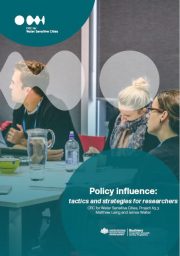From science to policy
Strategies for influencing the dynamics of political decision making
Would you like a customised training solution?
For more information, email admin@crcwsc.com.au
Introduction
Many scientists and research institutions aim to make science and research a greater part of the policy-making process. They want their work to have an impact on decision making in government, business, and the wider community.
The CRCWSC project 'Strategies for influencing the dynamics of decision making' spent three years exploring the question of how influential scientists and research bodies are involved in contemporary decision making in urban water. It looked too at what strategies and tactics might be used to increase the effectiveness of scientists and researchers when operating in political or decision-making spaces.
This work produced four outputs:
- an extensive review of the literature on science and policy-making interactions (published as the CRCWSC milestone report Science and policy influence: a literature review)
- an in-depth major case study of science and policy interactions in Victoria
- two experimental workshops on interactions between political decision makers and CRCWSC researchers (with the results published as ‘Scientists versus policy makers: building capacity for productive interactions across boundaries in the urban water sector’ in Environmental Science and Policy)
- interviews with 60 water industry figures, principally senior bureaucrats, utility managers and political decision makers working within the urban water policy sphere across Victoria, Queensland and Western Australia (with the findings discussed in Policy influence: tactics and strategies for researchers).
Here, we summarise some of the project's key takeaways relevant to scientists and researchers. These findings also apply more broadly to those interested in having greater influence over decision-making and policy-making processes.
The outcome
The Ten Commandments of
Influencing Government
In this section, Professor John Thwaites shares his insights from a long career in politics and influence on the how to maximise effectiveness in speaking to government. His ‘ten commandments’ provide a clear set of guidelines to follow when thinking about influence.
Strategic Thinking for
Influence-Seeking
In this section, Project A3.3 shares their key insights into the big-picture issues that should frame our thinking about influencing decision-making and policy-making. Building influence is a long-term commitment that requires planning and forethought.
Tactics for Effective Pitches and
Decision-Maker Communications
In this section, Project A3.3 shares their key findings on the techniques and approaches to communicating science and research effectively to policy and decisions-makers.
Training Videos from
Project A3.3 [Coming soon]
In this section, we have posted a number of videos from our series of capacity-building workshops on influence and policy translation, highlighting some of the concepts outlined in previous sections around communications and effective influence-seeking.
Interested in this solution?
We partner with small and large companies, government and industry in Australia and around the world.
